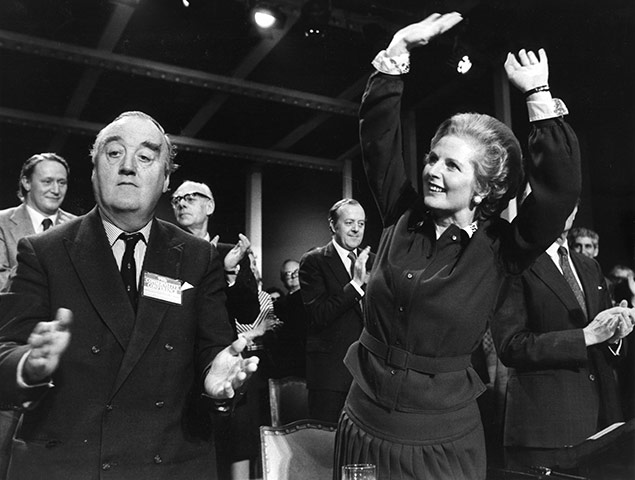Arguably one of the best loved “institutions” in Britain – the BBC was involved in constant battles with the Iron Lady and the Conservative Party. In Hilary Mantel’s book “The Assassination of Margaret Thatcher”, she reports that other political leaders followed her lead and favoured undermining the licence fee by encouraging ITV to “create television sets that received only commercial channels, giving viewers the opportunity to bypass the BBC”. Thatcher regarded this distinguished and well-loved broadcasting company’s licence fee as “a compulsory levy on those who have television sets”.
Above – Margaret Thatcher with Willie Whitelaw.
Thatcher was, apparently “concerned about the extravagance of some of the BBC’s spending”. Apparently, the company was then operating at a £50m deficit, so Home Secretary Willie Whitelaw, claimed she had a point.
Later “New Labour” led by Alastair Campbell – the Communications Chief, warred with the BBC over its reporting of the Iraq War, eliciting the Hutton Enquiry.
David Cameron has termed the BBC’s coverage of the Autumn Statement “Wigan Pier” in its attitude. Ofcom Chief Executive Ed Richards has remarked on the close relations between government officials and Rupert Murdoch’s News Corp as it “sought to outgun the BBC by taking control of BSkyB.” The BBC showed strong resilience to all this political and media-grabbing tactics. The BBC now has the biggest website in the UK which is a bone of contention with newspaper publishers. It is also a big player in breakfast television , and Thatcher was a friend of its rival – Bruce Gyngell – TV am’s pioneer. Douglas Hurd wrote of his worry over “a growing obsession against the BBC”, so there was definitely more than one viewpoint.
In 1985, BBC “Real Lives” gave a platform to previous commander of the IRA – Martin McGuinness and Thatcher was enraged. The BBC pulled the programme under her pressure. Norman Tebbit – described in a tabloid as her “attack dog” was constantly on the case of BBC reportage, including objections to coverage of America’s bombing of Libya in 1986.
During The Falklands War – Peter Snow was put down by the Tories on his lack of ability to accurately report British casualties, Thatcher remarking that Snow’s use of the term “the British” caused “offence”. It led to Tory MP’s tabling a motion accusing aunty Beeb of “anti British Bias”.
Though Thatcher always wanted an advertiser-based Beeb, she did not get her way.
Recently auntie has been under attack for its coverage of the Scottish referendum and the conflict in Gaza.
No doubt the pre election days will be contentious as a frenzied climate precedes its next 10-year licence fee settlement.

